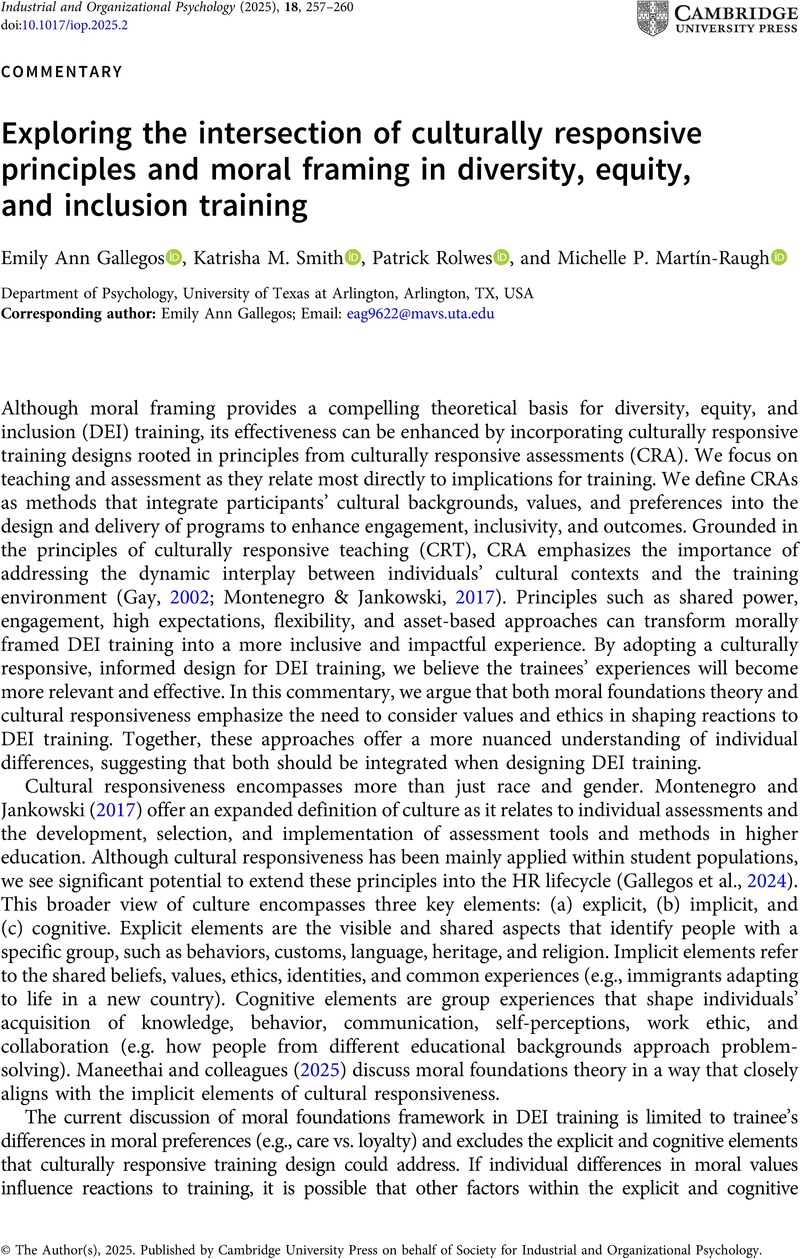No CrossRef data available.
Article contents
Exploring the intersection of culturally responsive principles and moral framing in diversity, equity, and inclusion training
Published online by Cambridge University Press: 30 June 2025
Abstract
An abstract is not available for this content so a preview has been provided. Please use the Get access link above for information on how to access this content.

Information
- Type
- Commentaries
- Information
- Copyright
- © The Author(s), 2025. Published by Cambridge University Press on behalf of Society for Industrial and Organizational Psychology
References
Aronson, B., & Laughter, J. (2016). The theory and practice of culturally relevant education: A synthesis of research across content areas. Review of Educational Research, 86(1), 163–206. https://doi.org/10.3102/0034654315582066
CrossRefGoogle Scholar
Gallegos, E., Smith, K. M., Syed, J., Brooks, R. R., & Martín-Raugh, M. P. (2024). Strategic responses to anti-DEI legislation: The promise of culturally responsive assessments. Industrial and Organizational Psychology, 17(4), 481–485. https://doi.org/10.1017/iop.2024.48
CrossRefGoogle Scholar
Gay, G. (2002). Preparing for culturally responsive teaching. Journal of Teacher Education, 53, 106–116. https://doi.org/10.1177/0022487102053002003
CrossRefGoogle Scholar
Hellerstedt, K., Uman, T., & Wennberg, K. (2024). Fooled by diversity? When diversity initiatives exacerbate rather than mitigate bias and inequality. Academy of Management Perspectives, 38(1), 23–42. https://doi.org/10.5465/amp.2021.0206
CrossRefGoogle Scholar
Kwak, D., Bell, M. C., Blair, K. S. C., & Bloom, S. E. (2024). Cultural responsiveness in assessment, implementer training, and intervention in school, home, and community settings: A systematic review. Journal of Behavioral Education, 1–48, https://doi-org.ezproxy.uta.edu/10.1007/s10864-024-09547-7
CrossRefGoogle Scholar
Long, D. A. (2009, November 7). The promise of customized training: Evidence from the United States. [Paper presentation]. Employment, Social Affairs and Equal Opportunity and the University of Maryland School of Public Policy.Google Scholar
Maneethai, D., Johnson, L. U., Atwater, L. A., & Witt, L. A. (2025). Enhancing engagement in the diversity training experience: Morality processes matter. Industrial and Organizational Psychology, 18.Google Scholar
Montenegro, E., & Jankowski, N. A. (2017). Equity and assessment: Moving towards culturally responsive assessment. Occasional Paper, 29(6), 10–11.Google Scholar
Paris, D. (2012). Culturally sustaining pedagogy: A needed change in stance, terminology, and practice. Educational Researcher, 41(3), 93–97. https://doi.org/10.3102/0013189X12441244
CrossRefGoogle Scholar
Sleeter, C. E. (2011). An agenda to strengthen culturally responsive pedagogy. English Teaching: Practice and Critique, 10(2), 7–23. https://doi.org/10.1177/0042085911431472
Google Scholar
Walker, M. E., Olivera-Aguilar, M., Lehman, B., Laitusis, C., Guzman-Orth, D., & Gholson, M. (2023). Culturally responsive assessment: Provisional principles. ETS Research Report Series, 2023(1), 1–24. https://doi.org/10.1002/ets2.12374
CrossRefGoogle Scholar

